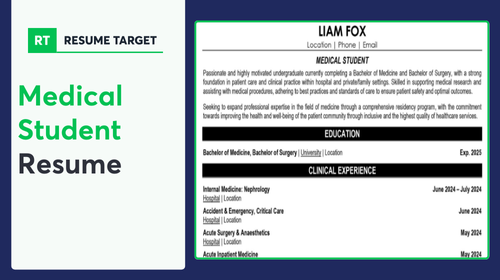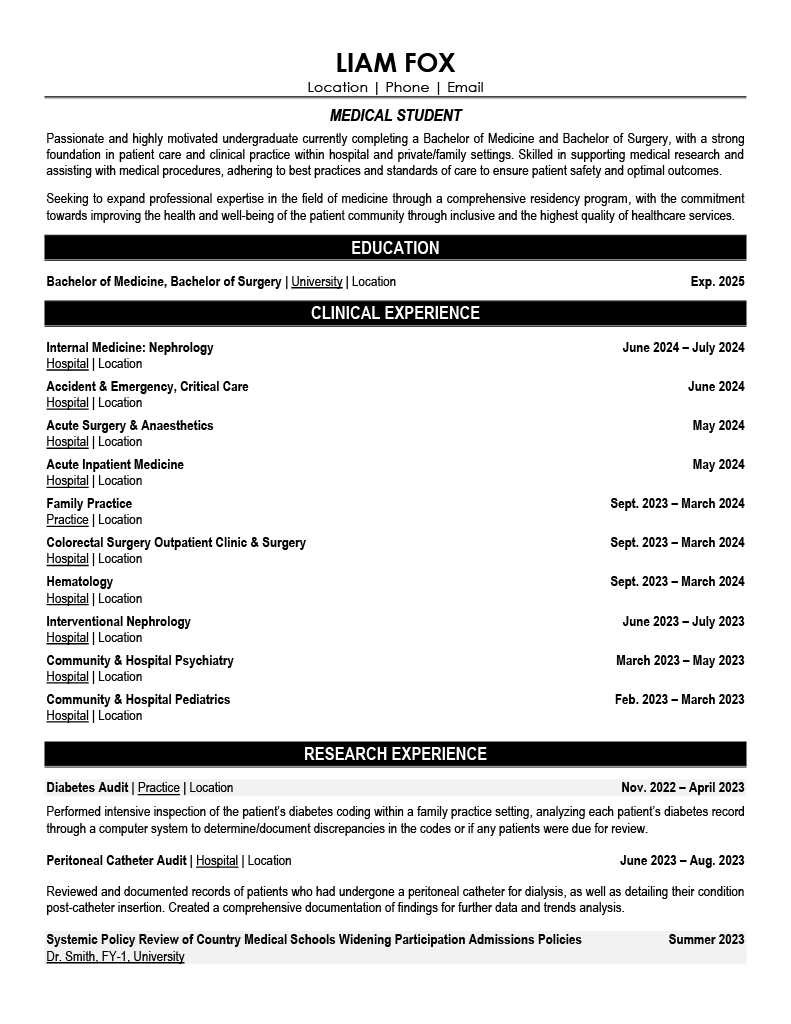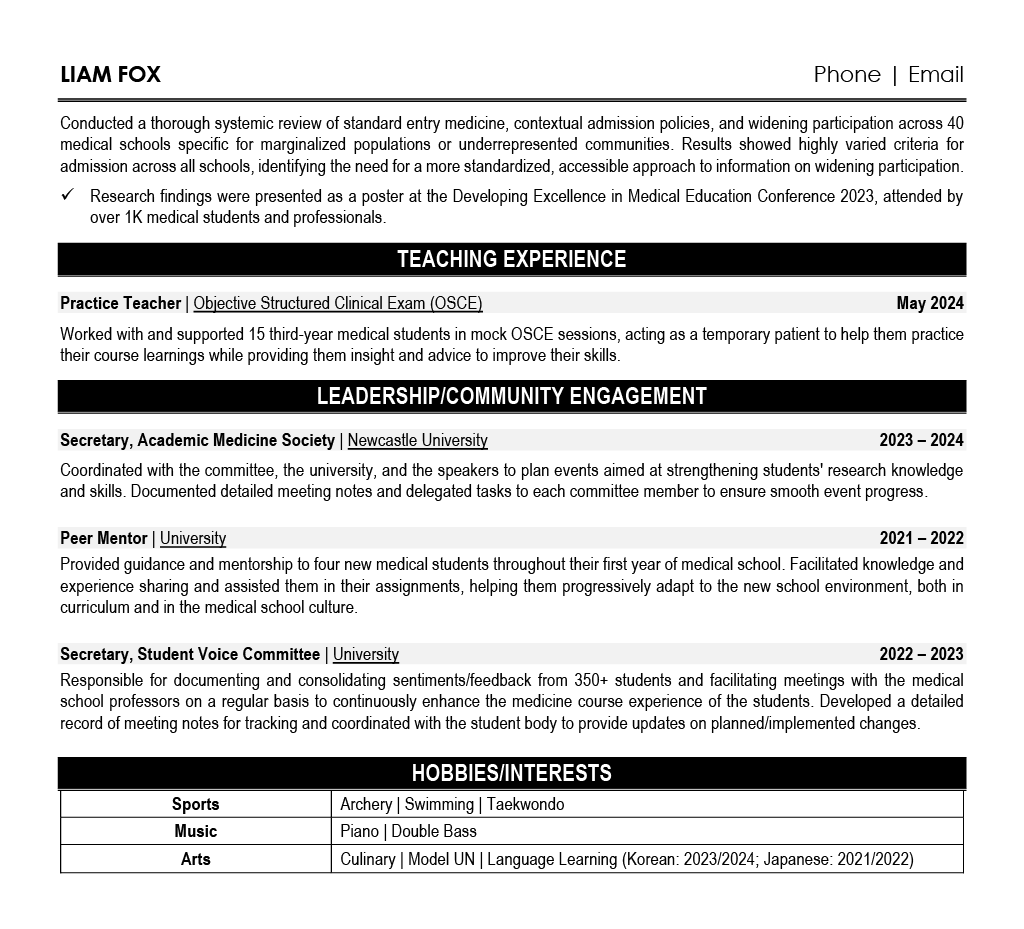

Getting into residency feels like a race where everyone else knows the rules except you. The competition is fierce, and your ERAS application needs to stand out from hundreds of other qualified candidates.
Are you wondering how to showcase your clinical rotations, research, and leadership roles effectively? Your residency application needs to tell a compelling story that program directors can't ignore, not just list your experiences.
Resume Target specializes in helping medical students transform their experiences into powerful ERAS applications. We understand the unique challenges of residency applications and know exactly what program directors look for when selecting their next class of residents.


As future physicians in training, medical students serve as vital members of healthcare teams while mastering the complex art of patient care through the structured RIME framework: Reporter, Interpreter, Manager, and Educator.
Throughout their intensive education, these aspiring doctors progress from observing and documenting patient cases to developing diagnostic reasoning skills, proposing treatment plans, and eventually teaching others - all while working closely with experienced physicians who supervise their growing clinical responsibilities.
Whether you're considering medical school or already embarking on this challenging journey, understanding the progression from classroom learning to hands-on patient care will help you navigate the transformative path from student to practicing physician.
Let's talk about the exciting earning potential in your medical career journey! As you progress from residency through various specialties, your compensation can grow significantly based on your chosen path and level of specialized training. The medical field offers diverse opportunities with rewarding financial outcomes, especially as you advance in your career.
Figures from: American Medical Association
The path from medical student to practicing physician involves structured progression through residency, specialization, and board certifications. Your journey begins with medical school and can lead to various specialized roles in healthcare.
Beyond medical knowledge, developing a comprehensive skill set will distinguish you as a standout healthcare professional.
- Clinical diagnostic expertise - Advanced patient care techniques - Medical research proficiency - Cultural competence and communicationBreaking into medical school becomes more achievable when you start with entry-level healthcare roles that build your clinical experience, patient care skills, and medical knowledge foundation.
To prepare for success in medical school, you'll need to develop essential competencies like service orientation, cultural competence, and ethical responsibility through hands-on healthcare experience.
Requirements from CareerStep
Healthcare job growth is booming nationwide, with 1.9 million annual openings projected across various specialties.
Figures from Bureau of Labor Statistics
Note: While specific geographic data for medical students is limited, I've focused on states with well-known medical education infrastructure and healthcare employment opportunities. The locations listed are based on general healthcare industry growth patterns and the presence of major teaching institutions.Struggling to translate your clinical rotations, research projects, and coursework into a compelling resume that stands out to residency programs and medical employers? Let's break down exactly how to craft each section of your medical student resume, step by step, so you can effectively showcase your clinical experience, academic achievements, and developing medical expertise.
As a medical student preparing to enter residency, crafting the perfect resume summary can feel as challenging as mastering complex diagnostic procedures.
While you've developed incredible clinical skills, research experience, and patient care abilities through your rotations and coursework, translating these achievements into a compelling written summary requires a strategic approach that speaks directly to residency program directors.
How would you describe your current stage of medical education and the specific areas of medicine that most deeply resonate with your career aspirations?
Reason: This helps frame your professional narrative and immediately signals to residency programs where you are in your journey and your intended specialty focus, setting the tone for the entire resume.
What combination of clinical rotations, research experience, and volunteer work best represents your holistic approach to medical practice and patient care?
Reason: This question helps you articulate your well-rounded medical background and demonstrates to program directors how you've developed both technical and interpersonal skills essential for medical practice.
How have your experiences across different healthcare settings shaped your understanding of medical practice and influenced your approach to patient care?
Reason: This helps you reflect on and communicate your evolving perspective on medicine, showing maturity in your professional development and readiness for residency responsibilities.
As a medical student, your skills section needs to demonstrate both your clinical competencies and your foundational medical knowledge, while showing progression through your medical education.
Your resume should balance technical medical skills (like patient assessment and basic procedures) with essential soft skills such as communication, teamwork in clinical settings, and cultural competency.
Examples of Medical Student resume skills: Clinical Skills: - Patient History Taking - Physical Examinations - Basic Clinical Procedures - Vital Signs Assessment - Medical Documentation - SOAP Note Writing - Basic Life Support (BLS) Technical Knowledge: - Anatomy & Physiology - Pharmacology - Pathology - Medical Terminology - Electronic Health Records (EHR) - Clinical Research Methods - Evidence-Based Medicine Professional Skills: - Patient Communication - Medical Ethics - Cultural Competency - Interprofessional Collaboration - Time Management - Problem-Based Learning - Critical Thinking - Medical Spanish (if applicable) Certifications & Tools: - HIPAA Compliance - EMR/EHR Systems - Medical Imaging Interpretation - Laboratory Data Analysis - Clinical Decision Support ToolsShowcase your clinical rotations, research projects, and patient care experience by organizing your medical background into three powerful sections: a concise role overview, measurable clinical achievements, and key medical responsibilities that highlight your growing expertise.
Many medical students struggle to effectively showcase their clinical rotations and research experience without sounding like every other candidate. Transform your experiences into compelling achievements by connecting your hands-on patient care, research contributions, and academic excellence to measurable outcomes that demonstrate your potential as a future physician.
The responsibilities section demonstrates how medical students contribute to patient care while learning clinical skills. It's crucial to translate complex medical experiences into clear achievements that show your growth as a future physician and your impact on healthcare delivery.
As a medical student, your educational background and certifications form the foundation of your clinical competency. Focus on highlighting your medical school progress, relevant pre-med coursework, and any additional certifications that demonstrate your commitment to patient care and medical knowledge.
Now that you've created a strong foundation using Resume Target's comprehensive resume writing guidelines, you're ready to transform your medical student resume into a powerful tool for clinical rotations and residency applications.
While many medical students focus their customization efforts solely on personal statements and cover letters, tailoring your resume for each specific program or rotation is equally crucial for standing out in this highly competitive field.
A customized medical student resume not only helps you navigate through automated application systems but also demonstrates to program directors that you've thoughtfully aligned your experiences and capabilities with their specific program requirements and medical specialty focus.
Ready to make your medical student resume work harder for you? Let's turn your credentials into compelling matches for your target programs and secure those crucial interviews!
Just starting your medical career journey? That's exciting! Your path to becoming a medical professional starts with a resume that showcases your academic achievements, clinical rotations, and relevant healthcare exposure.
Focus on highlighting your academic performance, any volunteer or clinical observation hours, and research projects you've participated in.
For a comprehensive approach to structuring your medical student resume, check out the Student Resume Writing Guide to ensure you're including all the essential elements that medical schools and residency programs look for.
Your resume summary is your chance to showcase your academic excellence, clinical rotations, and passionate commitment to patient care - even before completing your MD.
Focus on highlighting your hands-on clinical experiences, research contributions, and the unique perspectives you'll bring to medical practice.
"Dedicated and compassionate Medical Student with 3+ years of progressive clinical training and research experience. Completed 6 core clinical rotations with exceptional evaluations while contributing to two published research papers in oncology. Demonstrated strong patient communication skills and cultural competency through 200+ hours of direct patient interaction. Seeking residency position to leverage strong academic foundation and genuine passion for evidence-based patient care in a collaborative hospital environment."
Now's your chance to showcase the rigorous academic foundation that's preparing you for a career in medicine - make every detail count!
Transform your coursework and clinical rotations into compelling proof of your capabilities by highlighting key experiences like your anatomy lab research, patient case presentations, or that groundbreaking epidemiology project that perfectly aligns with your target specialty.
Insufficient data available despite thorough search.Relevant Coursework: Human Anatomy & Physiology | Clinical Medicine | Pathology | Pharmacology | Medical Ethics | Patient Care & Diagnosis
Key Projects:
Clinical Case Study Analysis: Developed comprehensive patient care strategies through analysis of complex medical cases in an emergency department setting, resulting in improved diagnostic approach and treatment planning.
Community Health Screening Initiative: Collaborated with a team of medical students and healthcare professionals to organize and execute preventive health screenings in underserved communities.
Transform your academic achievements, clinical rotations, and hands-on medical training into a compelling skills section that showcases your readiness for advanced medical responsibilities and patient care excellence.
As a medical student preparing to enter residency, your combination of clinical knowledge, patient care experience, and technical skills positions you well for the next exciting phase of your medical career, where you'll continue to grow and develop as a healthcare professional.
Trying to showcase your clinical rotations, research projects, and leadership roles all while maintaining that perfect academic tone? It's overwhelming to compress years of intense medical training into a compelling document that residency programs will notice.
Resume Target specializes in crafting standout CVs for medical students transitioning into residency, having helped hundreds of future physicians match with their dream programs.
Our deep understanding of the medical education landscape means we know exactly how to highlight your unique experiences - from that challenging pediatrics rotation to your groundbreaking research project.
With residency application season approaching fast, don't let an underwhelming CV hold you back from your perfect match - connect with our medical resume experts today to transform your application from good to exceptional.
Impress any hiring manager with our Student resume writing service. We work with all career levels and types of Student professionals.
Learn More → Student Resume Writing Services